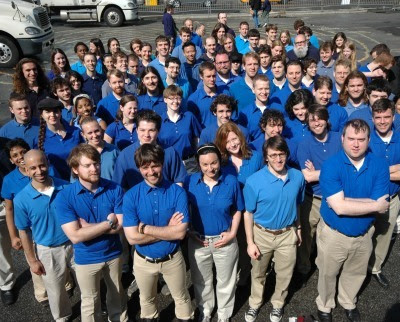
I just read an incredibly interesting and robust discussion on Freakonomics about the future of a uniquely American infrastructure, our suburbs.
Quite a few hot topics have made the out-dated infrastructure quite the conversation piece ranging from rising oil costs, to increased sourcing materials, to population shifts with over half of societies now living in urban areas. Lets not forget immigration nor the housing market either.
Freakonomics then asked a group of very smart folks "What will U.S. suburbs look like in 40 years?"
Granted these are projections and the answers ranged from apocalyptic to utopian:
James Kunstler - “The suburbs have three destinies, none of them exclusive: as materials salvage, as slums, and as ruins.” Our structure requires an infinite supply of cheap energy to function and is now in the middle of a global energy crisis. We have "poured a half-century of our national wealth into a living arrangement with no future". Our focus is too auto-laden, and we must realize that alternative fuels will ween us off the interstates and automobiles that dominate our culture.
Thomas E. Antus - “To pay for the expanded services taxes will also increase exponentially to the point where individual pay checks are made payable to the government and deposited directly in the general treasury.” Interesting notion on expansive role of government in basic utilities. I dont quite see things becoming so china-like but, he also touches on the notion of large mega-regions and NYC stretching from Philly and all of New Jersey. Richard Florida has touched on this in his new book.
Jan Brueckner - “If [gentrification] continues in a significant way, large numbers of suburban households looking for urban stimulation may end up switching places with minority central-city dwellers, stirring the ethnic pot in both places.” Not so sure about this one but, race is a big factor here. "Suburbanization has shown a white bias, with most minority households yet to acquire their nice house in the suburbs. Some of this difference may reflect a history of housing-market discrimination, but lower suburbanization by minorities is mainly a result of lower incomes. As the black and Hispanic middle classes continue to grow and get richer, they are likely to follow the same suburbanization path as white households before them, restrained somewhat by higher gas prices." Suburbs might continue to diversify as ethnic groups' clout continues to grow.
Gary J. Gates - “The Will and Grace version of gay America — urban, wealthy, and white — is starting to look a bit dated.” Very true. They look like each and everyone one of us and do they necessarily want to do the crowded city bit? They probably enjoy fences and yards like the rest of us. Alternative orientations are going to be more visible, more suburban, less likely to be white.
John Archer - “Suburbia will be flexible, it will be smarter, and it will be hybrid.” I found this one of the most optimistic, and true. The suburb is becoming a "hybrid place that melds desirable traits of city living (activity, diversity) while still maintaining allegiance to primary suburban ideals of selfhood and domesticity (and, one might add, consumption)". I see this most attainable given the investments already within the current infrastructure.
Alan Berube -“in 40 years perhaps we’ll get beyond our fixation with “the suburbs” (love them or hate them) and develop a richer vocabulary for what lies beyond the city limits.” I love this, maybe because much of strategic work is really context. And it pisses me off when we drive through connecticut and each town bleeds into the next. Cant we agree its really one big sprawling town? He too sees new hybrid forms in transportation structure, demographic influx, and governance.
Lawrence C. Levy - “It depends — on how smart and bold we are willing to be.” Oh smart, but he is author on here, maybe he gets the reservation. "A cycle of survival and renewal that will save the suburb from itself. If the federal government reduces incentives for sprawl (by shifting funds from highway building, for instance, to mass transit or to sewer construction necessary for “densifying” suburbs), the so-called “smart growth” movement will hasten and spread deeper into suburbia." Levy really hits the nail on the head, in that the largest challenge is our want and ability to be agents of change.
Our infrastructure encourages excess and sprawl, and until our collective consciousness is more omnipresent than its current reactionary state, we will continue to deal with the side-effects such as congestion and pollution. The conversation is exciting in that we seem to already be aware of the challenges and working towards solutions. Worth a read or two.
Suburban Story
Read more...


































